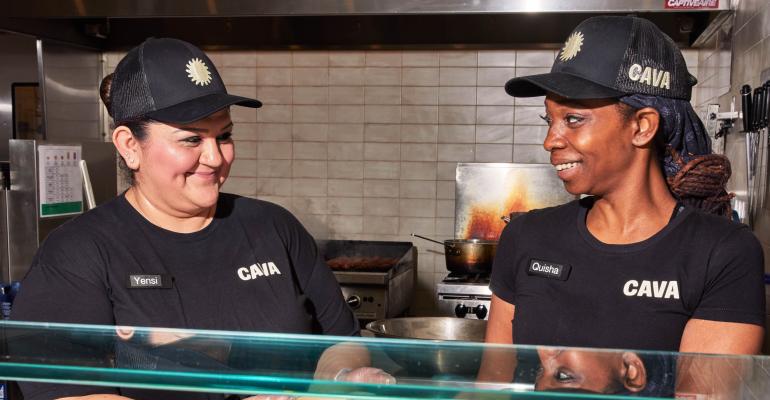There has been no shortage of news coming out of the restaurant industry the past couple of years about companies adding new benefits like mental health coverage, tuition reimbursement, caretaker subsidies, equity opportunities, and more. Indeed, new data from BentoBox finds that “paid time off” mentions in industry job listings have increased by 386% in the past year, while “paid vacation” has increased by 175%, and “mental health” has increased by 53%.
The pandemic and ensuing labor shortages, as well as changing demands from younger employees, have served as a catalyst for restaurant companies to rethink their people strategies. This was the topic of conversation during a Restaurant Leadership Conference panel and follow up roundtable discussion titled, “Meeting the moment – leading with possibility,” including Kelly Costanza, chief people officer at Cava, Laura Rueckel, chief marketing officer at Freddy’s Frozen Custard, and Sara Bittorf, chief experience officer at Red Lobster. I had the privilege of facilitating the panel, while the roundtable discussion was facilitated by Sarah Lockyer, chief brand officer of The Elliot Group. Here are the biggest takeaways:
- Yes, soft skills are critical now. Costanza said Cava is even in the process of operationalizing soft skills alongside the company’s job skills.
- The employee experience must be owned by everyone, not just HR or the CPO, and Rueckel and Bittorf are also both very much involved in their respective companies’ employee experience efforts. Communication at all levels, including franchisees, is the most effective way to achieve buy-in on such efforts.
- Bittorf said retention can’t be the only employee-focused metric, noting that engagement is more critical. Companies should make sure employees are engaged in whatever role they may have.
- All three panelists cautioned against trying to do too much, despite the increasing demands for more. Any company getting started on a people strategy should prioritize based on employee feedback, demographics, and budget.
- About that budget – there is a clear return on investment when it comes to people initiatives, the panelists said, and the work Cava, Freddy’s, and Red Lobster has done so far has resonated with their respective employees. This return is measured by employee surveys and other feedback mechanisms, as well as retention.
- It’s important to note that the employee proposition isn’t just about benefits or pay. Throwing too much at them – including new processes or menu items – can also make things difficult and simplifying operations or adding technology like mobile scheduling can make their lives easier.
- This work will continue to evolve as employee expectations continue to evolve, so it’s important to constantly listen to employees’ needs, create one-of-a-kind experiences for them, and address any issues that arise.
- As Costanza explained, people expect their companies to make their lives better now, not just to provide them with jobs. Restaurants have to be nimble to meet these changing demands. If they can do that, and employees are happy in their role, that will translate to the guests’ experience, and it will help your business thrive.
Contact Alicia Kelso at [email protected]

